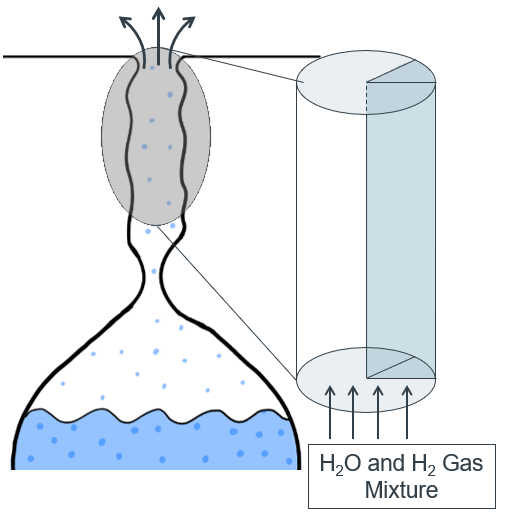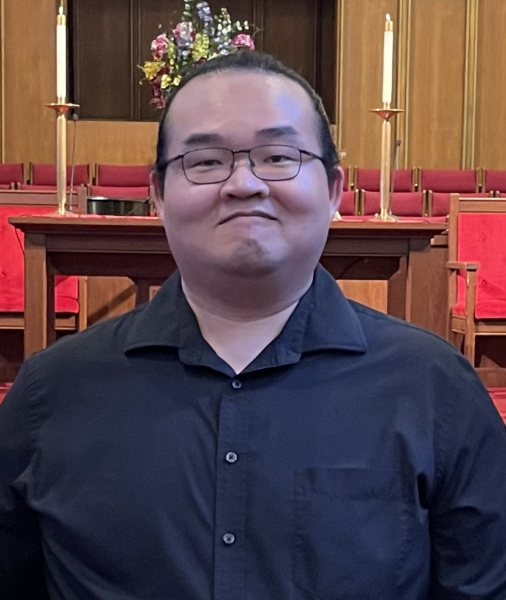CPSH Seminar Series: Mohammad Afzal Shadab, Chun-Yi Wu, Melina Zaharias, UT Austin
October 14, 2023
October 23, 2023 at 1:00pm CT
Graduate Student Short Talks
Host: Brandon Jones
Talk One
Speaker: Melina Zaharias, Graduate Student, Department of Aerospace Engineering and Engineering Mechanics, UT Cockrell School of Engineering
Title: Simulating Hydrogen in the Tiger Stripes of Enceladus
Abstract: Molecular Hydrogen was detected during Cassini’s final ‘E21’ flyby of Enceladus, providing strong evidence of potential habitability at an icy ocean world. Along with water vapor, molecular hydrogen (and other constituents) are being ejected from a series of fractures (conduits) that reach a deep underground reservoir from the surface of the moon. We use a Direct Simulation Monte Carlo method to model the flow of the gas mixture from below ground to just before it reaches the near-vacuum atmosphere of Enceladus, examining the flow’s sensitivity to various parameters.
Biography: Melina Zaharias is a PhD student in Aerospace Engineering at the University of Texas at Austin and a Center for Planetary and Space Habitability Fellow (2022). She works in the Computation Fluid Physics Laboratory, directed by Dr. David Goldstein, Dr. Philip Varghese, and Dr. Laurence Trafton. She holds a masters degree in Aerospace Engineering at UT as well. Prior to attending UT, she completed her under-graduate education at Furman University where she received bachelors degrees in Physics and Applied Mathematics.
Talk Two
Speaker: Chun-Yi Wu, Graduate Student, Department of Aerospace Engineering and Engineering Mechanics, UT Cockrell School of Engineering
Title: Planetary moon tour trajectory planning
Abstract: Most missions visiting the potentially habitable moons utilize long-duration flyby tours with the moons in the system, which reduces the fuel needed to reach the destination, and makes the mission feasible. A process to plan the tour and the algorithms facilitating the process are presented. The process includes (1) a low-fidelity broad search that uses a fast reach reachability algorithm to generate possible trajectories, (2) an intermediate medium-fidelity step that adds consideration of major perturbations during planning, and (3) an optimizer that optimizes the full trajectory. A full trajectory from Saturn entry to Enceladus orbital insertion is presented to showcase the capability of this process.
Biography: Chun-Yi Wu is a graduate student pursuing a Ph.D. in Aerospace Engineering at The University of Texas at Austin, studying under Dr. Ryan P. Russell. He has published a paper in the Journal of Spacecraft and Rockets, titled “Reachable Set of Low-Delta-v Trajectories Following a Gravity-Assist Flyby.” He has also been involved in various projects with John Hopkins University Applied Physics Laboratory and Lockheed Martin.
Talk Three (not recorded)
Speaker: Mohammad Afzal Shadab, Graduate Student, UT Oden Institute for Computational Engineering and Sciences
Title: Impact generated melt foundering on icy ocean worlds
Abstract: Meteorite impacts on icy ocean worlds can generate a large amount of liquid water near the surface. This generated meltwater can penetrate through the ice shell below and transport near-surface organics across the ice shell into the subsurface ocean underneath. In the ocean, the organics can undergo aqueous hydrolysis to form potential astrobiological building blocks, such as amino acids. In this work, we trace the dynamics of these organics and investigate the timescales of the foundering process. Furthermore, we develop a more sophisticated model to distinctly consider the dynamics of melt and ice phases. The preliminary results show much faster meltwater dynamics and therefore organics transport, in the new model compared to previously published works.
Biography: Mohammad Afzal Shadab (Afzal, he/him) is a PhD Candidate in Computational Science, Engineering and Mathematics at the University of Texas at Austin and a NASA Jet Propulsion Lab Graduate Fellow (’22 & ’23). His PhD thesis is on Modeling Subsurface Flow of Water in Earth and Planetary Sciences supervised by Prof. Marc Hesse at the Jackson School of Geosciences. He holds master’s degrees in Computational Science, Engineering, and Mathematics from UT, as well as in Mechanical Engineering from the Hong Kong University of Science and Technology. Prior to enrolling in the PhD program, he was a Visiting Graduate Researcher at MIT Fluids Lab. More information can be found here.




